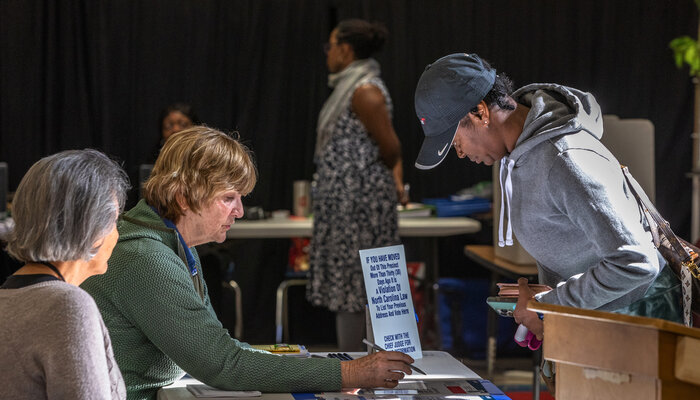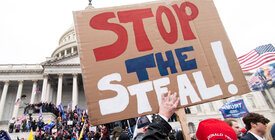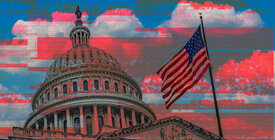For over a century, the Enforcement Acts have protected the civil rights guaranteed by the 13th, 14th, and 15th Amendments from infringement by extremist groups such as the Ku Klux Klan. Project 2025, a controversial conservative policy agenda, wants to turn that long-standing history on its head by using the laws to punish election officials for helping voters, pursue politically motivated prosecutions against partisan rivals, and weaken the Department of Justice’s (DOJ) Civil Rights Division.
Project 2025 would pervert civil rights laws.
The most glaring problem with Project 2025’s proposal is that it would use a law intended to protect civil rights to prosecute people who help others exercise their fundamental right to vote.
The plan proposes to prosecute election officials under Section 241 of Title 18 of the U.S. Code, which Congress enacted as part of the Enforcement Act of 1870. The act was the first of several laws, dubbed the Ku Klux Klan Acts, which aimed to protect the civil rights newly recognized in the post–Civil War constitutional amendments.
Section 241 criminalizes conspiracies to “injure, oppress, threaten, or intimidate any person” from the “free exercise or enjoyment of any right or privilege” under federal law. Historically, it was used to prosecute Klan members attempting to prevent Black Americans from voting. Over time, it has been used to prosecute a range of conspiracies to intimidate voters, suppress votes, and subvert election outcomes. In fact, President Trump faces a charge under Section 241 in DC federal court for his attempts to overturn the 2020 presidential election.
Rather than using Section 241 as intended to protect Americans from conspiracies to undermine their voting rights, Project 2025 sets forth detailed recommendations on how the Justice Department should use the law to prosecute individuals who protect those rights. As an example, the plan suggests prosecuting the Pennsylvania secretary of state for a practice used in the 2020 election: offering provisional ballots to voters whose mail ballots were rejected due to slight errors on their mail ballot envelopes.
As an initial matter, Project 2025 simply misstates Pennsylvania’s law governing the use of provisional ballots. In Pennsylvania, as in other states, voters can be issued a provisional ballot if they believe that they are eligible to vote, but a poll worker cannot initially confirm their eligibility — for example, when a voter does not have the right ID or if their eligibility is challenged. Most relevant for Project 2025, Pennsylvania law explicitly states that if a voter requests a mail-in or absentee ballot, and the district register does not show them as having voted (i.e., because of a disqualifying mistake on their envelope), they “may vote by provisional ballot.” This provision is clearly intended to ensure that only one ballot is counted for each voter in an election, while also providing a process to prevent eligible voters from being disenfranchised for honest mistakes — a far cry from the kind of voter suppression and intimidation criminalized under Section 241.
Project 2025, however, falsely suggests that Pennsylvania’s process was unlawful because state statutes did not specifically mention mistakes on mail ballot envelopes. First, this fundamentally misunderstands how elections are administered. Legislatures do not explicitly detail the minutiae of election practices and procedures in state statutes, and election officials regularly make myriad practical decisions about how to run elections consistent with state law.
Second, Project 2025’s argument is especially insidious because it implies that the federal government should use federal criminal law to police a state official’s compliance with state law. By no means is it appropriate for the Justice Department — a federal law enforcement agency — to determine whether any state official has properly exercised their authority of state law. It is even more inappropriate for a federal court to convict a state election official of a federal crime for allegedly misapplying state law. This outcome would not only violate both common sense and basic principles of federalism but also be at odds with recent Supreme Court precedent. Just last year, the Court in Moore v. Harper rejected arguments that the U.S. Constitution overrides state constitutional constraints on state law when it comes to regulating elections. In this way, Project 2025 attempts to accomplish what Moore did not: allowing federal officials to decide the meaning of state election law.
Project 2025 invites politically motivated prosecutions.
Project 2025’s proposal to prosecute state election officials stems from grievances over Donald Trump’s 2020 election defeat. Both before and in the days after the 2020 election, Trump’s campaign sued state officials across the country for a laundry list of false claims about routine election processes. Though courts resoundingly rejected the lawsuits, election deniers continue to peddle conspiracy theories about these processes and target the state officials who implement them. But a political grievance is not an appropriate criminal case.
For one, this line of attack cuts against the most basic tenets of our democracy. The criminal justice system relies on law enforcement officers and prosecutors to safeguard the constitutional guarantee of due process of law in criminal proceedings. For this reason, courts expressly prohibit prosecutors from pursuing cases out of “vindictiveness” or using their law enforcement powers to punish someone based on personal animus.
Politically motivated prosecutions against election officials also violate the DOJ’s own rules. The department’s Justice Manual specifically highlights “political association, activities, or belief[s]” as impermissible considerations when deciding whether to bring criminal charges. Further, the manual reminds federal prosecutors that they must exercise their authority in service of “the fair, evenhanded administration of the federal criminal laws.” The federal government’s Standards of Ethical Conduct for Employees of the Executive Branch similarly mandates that all employees “act impartially and not give preferential treatment to any private organization or individual” and “endeavor to avoid creating the appearance that they are violating the law or the ethical standards.”
Despite these clear rules and standards prohibiting prosecutors from pursuing politically motivated charges, Project 2025 suggests that there should be more prosecutions for “voter registration fraud” and laments the decision of George W. Bush’s Justice Department to back away from that type of prosecution. But Bush’s attorney general, Alberto Gonzales, resigned in scandal after it became clear that the DOJ had pressured prosecutors to pursue politically motivated “voter registration fraud” cases against organizations conducting nonpartisan voter registration drives in the lead-up to the election. Project 2025 proposes a return to that shameful practice.
Project 2025 would weaken the Justice Department’s Civil Rights Division.
The final piece in Project 2025’s anti-voter agenda is its plan to weaken and distort the DOJ’s Civil Rights Division. The division has played a prominent role in enforcing civil rights laws ever since Congress created it through the Civil Rights Act of 1957. Indeed, attorneys from the division have been involved in historically significant cases such as the investigations of the assassinations of Dr. Martin Luther King Jr. and Medgar Evers, the police beating of Rodney King in Los Angeles, and the murders of three civil rights workers in Mississippi in 1964. Project 2025 would strip the division of its authority to conduct such prosecutions, removing the power to enforce civil rights laws from the division created precisely for that purpose and placing it instead within the DOJ’s Criminal Division.
The plan does not stop there. It separately proposes to “reorganize and refocus” the Civil Rights Division to challenge diversity, equity, and inclusion policies. The plan’s authors claim that an “unholy alliance of special interests, radicals in government, and the far Left” have “besieged” the public and private sectors with these policies and that the Biden administration has used the Civil Rights Division to “enshrine[] affirmative discrimination in all aspects of [the Administration’s] operations under the guise of ‘equity.’” To remedy these “invidious schemes,” Project 2025 proposes that the division “spend its first year under the next Administration using the full force of federal prosecutorial resources to investigate and prosecute all state and local governments, institutions of higher education, corporations, and any other private employers” who engage in this so-called discrimination.
In short, just as it proposes using Section 241 to prosecute those who facilitate voting, it also suggests using all of civil rights law, and the federal agency primarily responsible for enforcing it, to take down programs aimed at providing people of color with equal opportunities. This utter perversion of the division’s mission would put a target on diversity, equity, and inclusion initiatives everywhere, as well as undo much of the recent progress that has been made against race discrimination in many sectors.
• • •
At bottom, Project 2025’s anti-voter agenda would cause devastating damage to our democracy and election systems. Even if courts rejected politically motivated prosecutions as meritless, the harm would be substantial. If election officials see their peers dragged into court simply for helping people vote, they would undoubtedly think twice before doing the same. And if organizers see their colleagues arrested for registering voters, it would likely be much harder to recruit future volunteers.
Every individual, regardless of party, relies on election officials to prioritize their right to vote and on nonpartisan organizations to help them exercise it. But the people who do this vital work have already faced unprecedented attacks in recent years, contributing to higher election official turnover and cutbacks to voter registration drives. Project 2025’s proposals would dramatically escalate these trends at the expense of all voters.
This article has been updated to include additional detail on Pennsylvania’s law on mail-in and provisional ballots.





